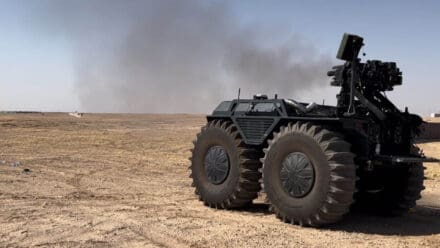A Rheinmetall system for combating drones at ultra-close range has demonstrated its effectiveness in a joint exercise with representatives of the U.S. Army Central Command and the Saudi Arabian Armed Forces. The Red Sands III exercise took place in September 2024 at the Shamal 2 firing range in north-eastern Saudi Arabia and focused on countering uncrewed aerial systems (C-UAS).

The multinational exercise provided a challenging environment for assessing C-UAS solutions. At the same time, it enabled technology developers and operational personnel to work together to close capability gaps. The exercise was preceded by successful qualification tests, which took place in the United States in the summer of 2024.
Designed as the last line of defence against small low-flying and fast-moving drones, Rheinmetall’s ultra Short-Range Air Defence (SHORAD) system offers an engagement range from 50 to 800 m. The Mission Master XT uncrewed ground system (UGS) serves as the carrier platform.
Developed by Rheinmetall Canada, the system consists of the Rheinmetall Fieldranger Multi remote-controlled weapon station with a twin Dillon Aero M134D minigun, a radar, an electronic optics package and an artificial intelligence (AI)-based target acquisition and tracking system. This advanced layered defence system is capable of engaging multiple threats with formidable fire power. It offers multi-domain capabilities that execute with precision when detecting, tracking and engaging aerial and ground threats.

Rheinmetall’s ultra SHORAD system mounted on the Mission Master XT
Strong performance despite harsh desert conditions
In the final phase of Red Sands III, five challenging scenarios were set up to simulate real-world threats. In all scenarios, participants’ capabilities were assessed against Group 2 and 3 multi-rotor drones as well as Group 3 fixed-wing aircraft. Rheinmetall’s ultra SHORAD system demonstrated superior capabilities, scoring hits on all drones and successfully neutralizing every multirotor drone on the first pass. This performance was only matched by Rheinmetall and participants with costly advanced missile systems.
Even under the extreme conditions of the Saudi Arabian desert – where temperatures sometimes reached up to 45 °C – Rheinmetall’s ultra SHORAD system excelled thanks to its rapid operational readiness and its resistance to weapon interference, overheating and interruptions to the power supply. Earlier exercises at Fort Drum NY, USA, also demonstrated the system’s resilience in high humidity and heavy rain. Another outstanding feature is the system’s AI-driven tracker, which detects and classifies drones long before they are engaged, even in dusty conditions and poor visibility.
In addition to its operational success, Rheinmetall’s system proved to be extremely efficient. With a low cost per engagement, it represents a sustainable and economical solution.
A benchmark for the future development of CUAS
The exercise – an example of the partnership between the Saudi Arabian Armed Forces and U.S. Army Central Command – provided a valuable platform for assessing and refining systems in real-world scenarios. “We are proud to have played a critical role in enhancing operational readiness and fostering innovation to effectively counter emerging threats,” said Alain Tremblay, Vice-President Business Development and Innovation at Rheinmetall Canada. Rheinmetall’s performance at Red Sands III underscores the company’s leadership in providing reliable, adaptable and cost-effective solutions that meet the evolving requirements of modern defence operations worldwide.
This entry was posted
on Wednesday, December 18th, 2024 at 23:00 and is filed under International, Press Release, Robotics, UAS, weapons.
You can follow any responses to this entry through the RSS 2.0 feed.
You can skip to the end and leave a response. Pinging is currently not allowed.
